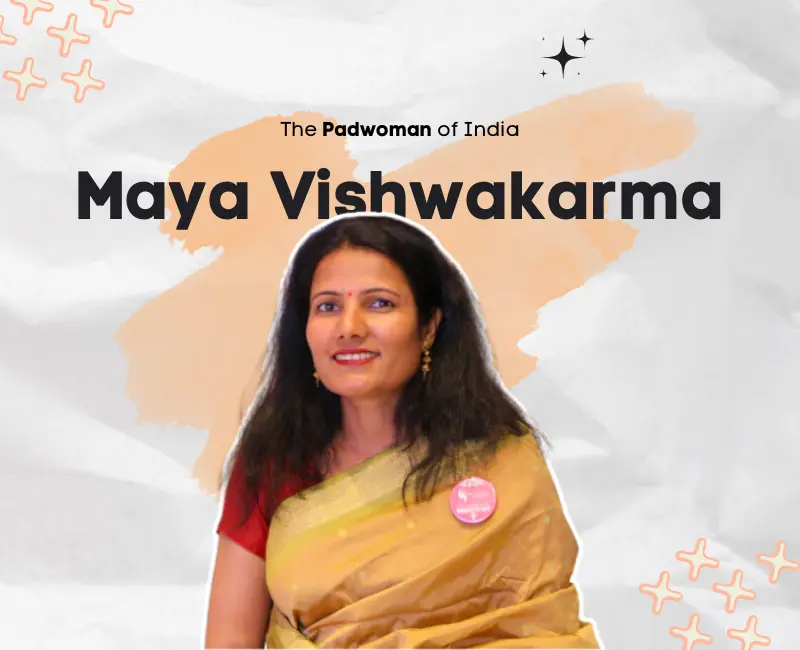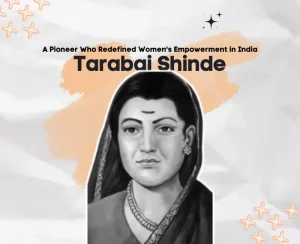Empowering Women Through Innovation: The Story of Maya Vishwakarma, India’s Padwoman

In rural India, where problems frequently outweigh resources, Maya Vishwakarma is a shining example of empowerment and creativity. Affectionately referred to as India’s “Padwoman,” Maya has committed to tackling a vital but sometimes disregarded matter: menstruation health. Maya personally experienced the difficulties encountered by women and girls who did not have access to reasonably priced and clean menstruation supplies because she was born and reared in a rural hamlet in Madhya Pradesh. She embarked on an innovative and advocacy journey to change menstrual hygiene habits in her neighborhood and beyond. She was determined to make a difference. This is the tale of Maya Vishwakarma, a worldwide inspiration for change and a story of empowerment through creativity that crosses national boundaries.
The Birth of “Khushi“: Maya’s Revolutionary Sanitary Pad
India’s “Padwoman,” Maya Vishwakarma, has gained notoriety as a leading authority on women’s health and empowerment. Maya, a native of a small Madhya Pradesh hamlet, was intimately familiar with the stigmas and difficulties related to menstruation in her society. Due to shame and pain, many women and girls in rural India either turn to unsanitary habits or forego educational and economic possibilities because they cannot afford or readily acquire clean menstruation supplies. With a strong sense of empathy and a desire to bring about change, Maya tackled these problems head-on. Maya entered the field of invention after seeing the demand for feminine hygiene products that were both economical and ecological. She created a low-cost alternative to commercial sanitary pads by taking cues from customary procedures and applying locally sourced materials.
Maya created the “Khushi” sanitary pad using her creativity and determination. The product is constructed from components easily found in rural regions, such as cotton and pine wood pulp. These pads not only meet the needs of women from diverse socioeconomic situations in terms of affordability, but they also address environmental issues because they decompose naturally. Maya’s invention gave women the power to take charge of their menstrual hygiene and health and offer a workable answer to an urgent problem.
Maya saw the value of education and knowledge in de-stigmatizing menstruation and empowering women, even outside product production. She fought relentlessly to dispel long-held myths and taboos around menstruation and promote menstrual hygiene education in communities and schools. Maya’s initiatives promoted a better understanding of menstruation products and a cultural shift, where menstruation is no longer shrouded in secrecy and shame but embraced as a natural aspect of women’s health.
Maya Vishwakarma’s rise from a small Indian hamlet to the head of the menstrual health movement proves the strength of self-motivation and grassroots creativity. Her narrative inspires women everywhere, demonstrating that perseverance and ingenuity can solve even the most ingrained social problems. Maya, known as India’s “Padwoman,” is a trailblazer for women’s empowerment and social transformation, setting an example for the next generations to take charge of their bodies and lives.
Originating from a small village tucked away in the picturesque Madhya Pradesh countryside, Maya Vishwakarma’s journey to become India’s “Padwoman” began with a keen observation of women and girls’ struggles in her community. Having grown up in the pastoral simplicity of rural life, Maya was acutely aware of the obstacles women faced in obtaining affordable and hygienic menstrual hygiene products. In the peaceful simplicity of her village, Maya witnessed firsthand the stark reality of menstrual health disparities: many women and girls were limited in their ability to afford the prohibitively expensive commercial sanitary pads on the market.
This left them with no choice but to turn to improvised solutions, often utilizing unhygienic materials like rags, newspapers, or even leaves during menstruation. These makeshift methods not only posed severe health risks, such as infections and reproductive complications, but also perpetuated a culture of shame and silence surrounding menstruation.
Affordable and Eco-Friendly Menstrual Solutions
Maya’s heart was too sensitive to ignore the suffering of her fellow peasants. She was driven to act with a strong empathy and a strong desire to make them feel better. Maya realized that the inability to get reasonably priced menstrual hygiene products was a fundamental problem that affected gender equality, health, and dignity more than just a minor nuisance. Motivated by her steadfast dedication to bringing about transformation, Maya set out on an exploration and inventive adventure. Equipped with unwavering dedication and spirit, she endeavored to devise a solution that would allow women access to menstrual hygiene products that are secure, reasonably priced, and long-lasting.
Maya’s story, which began in a small Madhya Pradesh town and brought her to the forefront of India’s menstrual health movement, is proof of the transformational potential of empathy, tenacity, and grassroots creativity. Her experience is a powerful illustration of how one person’s steadfast determination can spark good change, energizing communities and giving women the confidence to regain control of their bodies and lives. With a strong sense of empathy and a strong desire to confront menstruating health issues plaguing her society, Maya Vishwakarma set out on a quest driven by compassion and tenacity. Having personally observed the difficulties faced by women and girls in their quest for reasonably priced and sanitary menstrual hygiene products, Maya realized there was an immediate need for a long-term fix.
Inspired by the traditional method of menstruation hygiene—using cloth—Maya embarked on an inventive and resourceful adventure. She knew the conventional cloth approach frequently lacked comfort and cleanliness while being easily accessible and reasonably priced. In light of this, Maya developed an inexpensive, environmentally responsible substitute that would blend the cloth’s affordability with the commercial sanitary pads. Maya approached the task of researching and experimenting with different materials and techniques with a creative spirit and unyielding drive. To realize the possibilities of the plentiful locally obtained materials in her rural surroundings, she investigated their suitability for developing a workable menstrual hygiene solution. Maya developed her abilities and streamlined her strategy by trial and error, motivated by a unique goal of providing women with a sustainable and efficient answer.
Maya’s perseverance eventually paid off when the “Khushi” sanitary pad was created. This ground-breaking invention expertly balanced cost, hygienic standards, and environmental friendliness. Constructed using indigenous resources like cotton and pulp from pine wood, the Khushi pad provided a practical substitute for disposable sanitary pads, meeting the particular requirements and difficulties of the community.
Empowering Women Through Innovation
In addition to giving women access to reasonably priced and safe menstrual hygiene products, Maya’s creative strategy opened the door for community empowerment and sustainable development. Maya exemplified the revolutionary potential of grassroots creativity in tackling intricate societal challenges by utilizing customs and local resources.
Maya Vishwakarma became a leader in menstrual health advocacy through her persistent commitment to making a difference and her innovative attitude, which encouraged many women to follow in her footsteps. Her experience is a compelling example of each person’s capacity for good, showing us that even the most basic concepts can improve people’s lives and societies.
With the creation of the “Khushi” sanitary pad, Maya Vishwakarma’s revolutionary contribution to menstrual hygiene reached a new height. This product transformed menstrual care in rural India and tackled essential issues of affordability and environmental sustainability. Based on her profound comprehension of the obstacles women encounter while trying to get menstrual hygiene products, Maya set out to develop a solution that would be both practical and affordable. Using materials that could be found easily in her rural community, Maya devised a creative way to produce pads that put price and environmental friendliness first.
Maya ensured that even the most economically deprived people could afford the Khushi pad by using easily accessible and reasonably priced materials. But Maya’s inventiveness went beyond cost-effectiveness. Maya designed the Khushi pad to be biodegradable, which sets it apart from its synthetic equivalents, realizing the urgent need for sustainable solutions in the face of escalating environmental concerns. The non-biodegradable nature of conventional pads makes them a source of environmental pollution; in contrast, the Khushi pad provided a more ecologically friendly substitute that reduced the planet.
Maya Vishwakarma successfully addressed the economic and environmental problems of menstruation hygiene with the invention of the Khushi pad. She not only opened up access to menstrual care for women in rural India, but she also cleared the path for a more sustainable method of managing menstruation that put the health of people and the environment first. In addition to revolutionizing menstruation hygiene in India, Maya’s invention of the Khushi pad gave hope to people facing comparable difficulties worldwide. Her unwavering commitment to advancing women’s rights and preserving the environment is a potent reminder of the revolutionary potential of grassroots ingenuity in tackling complex social and environmental problems.
Maya’s Journey to Transform Women’s Health
We have taken note of Maya Vishwakarma’s extraordinary contributions to the realm of menstrual hygiene and her diligent efforts. Her campaign to solve the urgent issues that rural Indian women confront has received much national and international attention and support. In addition to changing lives in her neighborhood, Maya’s steadfast dedication to empowering women and improving menstruation health has sparked similar efforts throughout India and beyond. Communities and organizations nationwide are embracing Maya’s trailblazing work as she pioneers a new wave of change in menstrual hygiene.
Traditional methods of menstrual health and cleanliness have been called into question as a result of her advocacy for reasonably priced and environmentally friendly menstruation products, which has struck a chord with both people and organizations. By imparting her expertise and experiences through workshops, seminars, and outreach programs, Maya has catalyzed a broader conversation about the importance of menstrual hygiene and women’s empowerment in India’s social and cultural landscape.
Many honors and recognitions have been given to Maya Vishwakarma in appreciation of her exceptional efforts. Among them is the esteemed Nari Shakti Puraskar, the highest civilian honor for women in India, honoring remarkable contributions to gender equality and women’s empowerment. This prestigious award is a tribute to Maya’s steadfast commitment and outstanding leadership in promoting women’s rights and welfare in India.
In addition to receiving individual recognition, Maya’s work has been praised for serving as an inspiration and ray of hope for women and girls nationwide.
Her narrative has been told in national and international media outlets, highlighting the significance of menstruation hygiene and the game-changing potential of grassroots projects spearheaded by women like Maya. Using her activism and advocacy, Maya Vishwakarma has not only improved women’s lives in her community. Still, she has also ignited a movement for change that reverberates across India and beyond. Her legacy serves as a powerful reminder of the potential for individuals to make a profound and lasting impact on society through compassion, innovation, and determination.
Conclusion
Maya’s endeavors have received extensive acknowledgment and backing. In addition to enhancing women’s lives in her local neighborhood, her program has inspired similar projects throughout India. She has won many honors and distinctions for her efforts, including India’s highest civilian honor for women, the Nari Shakti Puraskar. Maya Vishwakarma has become a symbol of empowerment via her inventiveness, tenacity, and dedication to social change, demonstrating that even the most basic ideas can have a significant influence on society. Her experience serves as a reminder of the value of grassroots creativity and the difficulties women encounter worldwide.


